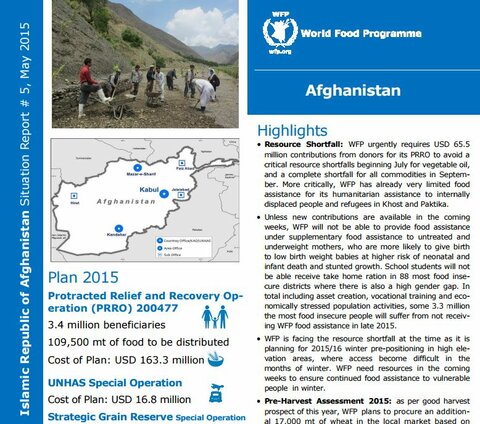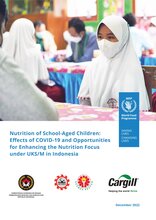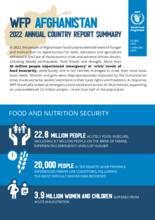
- Resource Shortfall: WFP urgently requires USD 65.5 million contributions from donors for its PRRO to avoid a critical resource shortfalls beginning July for vegetable oil, and a complete shortfall for all commodities in September. More critically, WFP has already very limited food assistance for its humanitarian assistance to internally displaced people and refugees in Khost and Paktika. Unless new contributions are available in the coming weeks, WFP will not be able to provide food assistance under supplementary food assistance to untreated and underweight mothers, who are more likely to give birth to low birth weight babies at higher risk of neonatal and infant death and stunted growth. School students will not be able to receive take home ration in 88 most food insecure districts where there is also a high gender gap. In total including asset creation, vocational training and economically stressed population activities, some 3.3 million the most food insecure people will suffer from not receiving WFP food assistance in late 2015. WFP is facing the resource shortfall at the time as it is planning for 2015/16 winter pre-positioning in high elevation areas, where access become difficult in the months of winter. WFP need resources in the coming weeks to ensure continued food assistance to vulnerable people in winter.
- Pre-Harvest Assessment 2015: As per good harvest prospect of this year, WFP plans to procure an additional 17,000 mt of wheat in the local market based on availability of resources. If funds from donors are available now, WFP will be able to purchase surpluses from farmers at competitive prices during this period (July to September), it will have significant impact on the agriculture development of the country and generate savings thereby maximizing the use of funds received donors to attend to the needs of beneficiaries.
- WFP’s new Gender Policy: WFP new global Gender Policy (2015-2020) has been approved and currently rolled out in the field. WFP’s gender policy recognizes that gender roles (the social roles of boys and girls, women and men of various ages) affect opportunities, access to resources and services and participation in decision making. Gender inequality in itself a major cause of hunger and poverty. As per new gender policy, WFP Afghanistan will create an enabling institutional environment in WFP to promote gender equality and the empowerment of women, which is reflected in its programmes and projects addressing food and nutrition challenges.
| Document | File |
|---|---|
| WFP Afghanistan Situation Report #05, May 2015 |
PDF | 736.18 KB
Download
|


